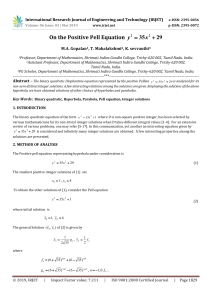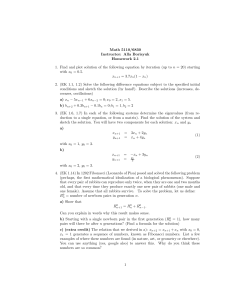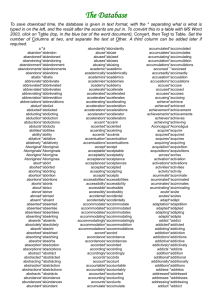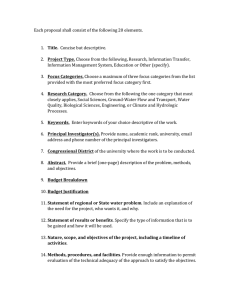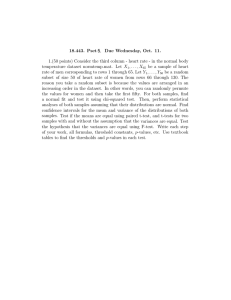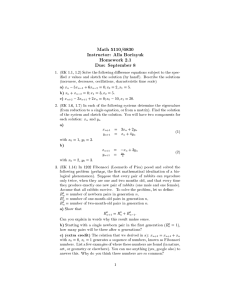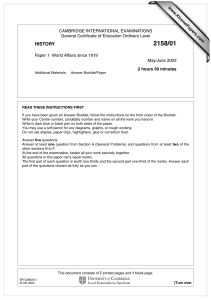IRJET-On Binary Quadratic Equation 2x2-3y2=-4
advertisement
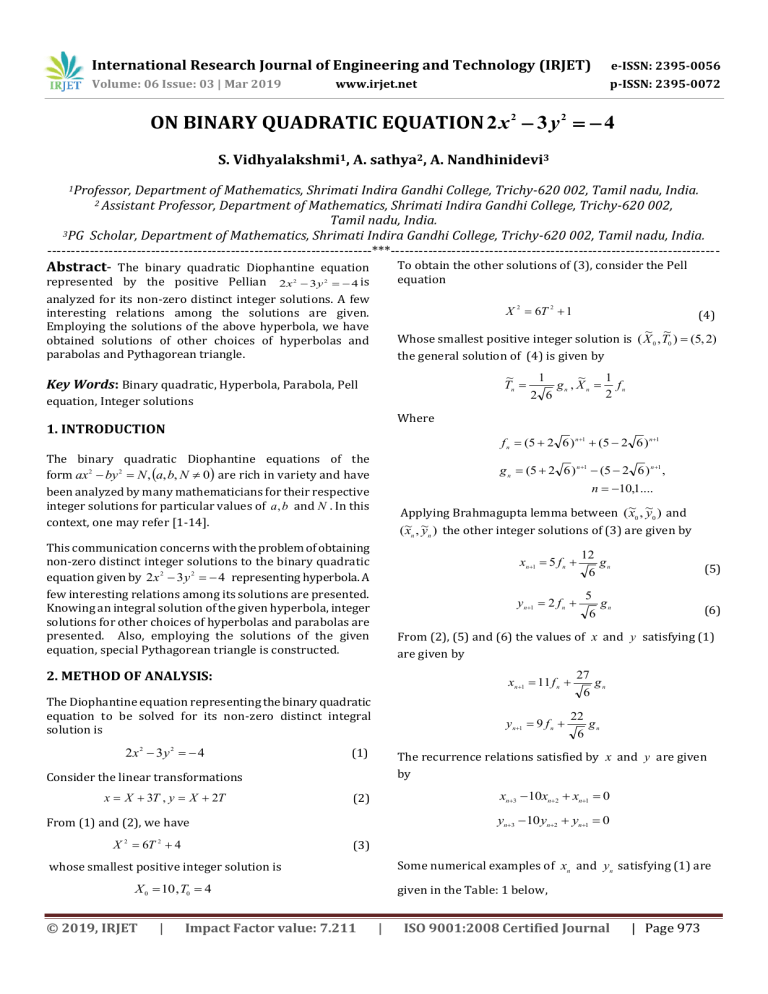
International Research Journal of Engineering and Technology (IRJET) e-ISSN: 2395-0056 Volume: 06 Issue: 03 | Mar 2019 p-ISSN: 2395-0072 www.irjet.net ON BINARY QUADRATIC EQUATION 2 x 2 3 y 2 4 S. Vidhyalakshmi1, A. sathya2, A. Nandhinidevi3 1Professor, Department of Mathematics, Shrimati Indira Gandhi College, Trichy-620 002, Tamil nadu, India. Professor, Department of Mathematics, Shrimati Indira Gandhi College, Trichy-620 002, Tamil nadu, India. 3PG Scholar, Department of Mathematics, Shrimati Indira Gandhi College, Trichy-620 002, Tamil nadu, India. ---------------------------------------------------------------------***---------------------------------------------------------------------2 Assistant Abstract- The binary quadratic Diophantine equation To obtain the other solutions of (3), consider the Pell equation represented by the positive Pellian 2 x 2 3 y 2 4 is analyzed for its non-zero distinct integer solutions. A few interesting relations among the solutions are given. Employing the solutions of the above hyperbola, we have obtained solutions of other choices of hyperbolas and parabolas and Pythagorean triangle. X 2 6T 2 1 ~ ~ Whose smallest positive integer solution is ( X 0 , T0 ) (5, 2) the general solution of (4) is given by ~ ~ 1 1 Tn gn , X n fn 2 2 6 Key Words: Binary quadratic, Hyperbola, Parabola, Pell equation, Integer solutions Where 1. INTRODUCTION f n (5 2 6 ) n1 (5 2 6 ) n1 The binary quadratic Diophantine equations of the form ax 2 by 2 N , a, b, N 0 are rich in variety and have been analyzed by many mathematicians for their respective integer solutions for particular values of a, b and N . In this context, one may refer [1-14]. g n (5 2 6 ) n 1 (5 2 6 ) n 1 , n 10,1.... Applying Brahmagupta lemma between ( ~ x0 , ~ y0 ) and ~ ~ ( x , y ) the other integer solutions of (3) are given by n This communication concerns with the problem of obtaining non-zero distinct integer solutions to the binary quadratic equation given by 2 x 2 3 y 2 4 representing hyperbola. A few interesting relations among its solutions are presented. Knowing an integral solution of the given hyperbola, integer solutions for other choices of hyperbolas and parabolas are presented. Also, employing the solutions of the given equation, special Pythagorean triangle is constructed. 5 6 gn (5) gn (6) 27 6 22 6 gn gn The recurrence relations satisfied by x and y are given by (2) xn3 10xn2 xn1 0 yn3 10 yn2 yn1 0 (3) Some numerical examples of xn and yn satisfying (1) are whose smallest positive integer solution is X 0 10 , T0 4 | y n1 2 f n 6 (1) From (1) and (2), we have X 2 6T 2 4 12 y n1 9 f n Consider the linear transformations x X 3T , y X 2T xn1 5 f n xn1 11 f n The Diophantine equation representing the binary quadratic equation to be solved for its non-zero distinct integral solution is 2x 2 3 y 2 4 n From (2), (5) and (6) the values of x and y satisfying (1) are given by 2. METHOD OF ANALYSIS: © 2019, IRJET (4) Impact Factor value: 7.211 given in the Table: 1 below, | ISO 9001:2008 Certified Journal | Page 973 International Research Journal of Engineering and Technology (IRJET) e-ISSN: 2395-0056 Volume: 06 Issue: 03 | Mar 2019 p-ISSN: 2395-0072 www.irjet.net Table: 1 Numerical Examples n xn yn 0 1 2 3 4 5 22 218 2158 21362 211462 2093258 18 178 1762 17442 172658 1709138 Each of the following expressions represents a nasty number: Both 1 60 162 y2n3 1308x2n2 5 1 588 162 y2n4 12948x2n2 49 12 267x2n4 2643x2n3 xn and yn values are even. 1 60 1602 y2n2 132x2n3 5 12 1602 y2n3 1308x2n3 xn3 10xn2 xn1 0 yn2 5 yn1 4xn1 0 1 60 1602 y2n4 12948x2n3 5 1 588 15858y2n2 132x2n4 49 1 60 15858 y2n3 1308x2n4 5 12 15858y2n4 12948x2n4 xn3 xn1 12 yn2 0 5xn1 xn2 6 yn1 0 xn1 5xn2 6 yn1 0 5xn1 49xn2 6 yn3 0 60 yn3 49xn3 xn1 0 xn3 49xn1 60 yn1 0 5 yn 3 49 yn 2 4xn1 0 7 xn3 1580 yn3 125857xn1 0 49 yn1 yn 3 40xn 1 0 6 yn1 5xn3 49xn2 0 6 yn2 21365 xn3 211489 xn2 0 44xn2 5xn1 539 yn1 0 5 yn2 yn1 4xn2 0 yn3 yn1 8xn2 0 xn3 5xn2 6 yn2 0 yn3 5 yn2 4xn2 0 49 yn2 5 yn1 4xn3 0 49 yn3 yn1 40xn3 0 5y y 4x 0 n3 n 2 n3 5 yn1 yn2 4xn1 0 yn3 10 yn2 yn1 0 4xn1 49 yn2 5 yn3 0 | Impact Factor value: 7.211 1 48 1308 y2n2 132 y2n3 4 1 480 12948y2n2 132 y2n4 40 1 48 12948y2n3 1308y2n4 4 Each of the following expressions represents a cubical integer: 6 yn3 5xn3 xn2 0 © 2019, IRJET 267x2n2 1 120 27x2n4 2643x2n2 10 12 162 y2n2 132x2n2 Relations among the solutions are given below: 2 n3 From the above table, we observe some interesting relations among the solutions which are presented below: 12 27x | 1 27 x3n4 267 x3n3 81xn2 6 801xn1 1 27 x3n5 2643x3n3 81xn3 60 7929xn1 27 y3n3 22 x3n3 81yn1 66 xn1 1 27 y3n4 218x3n3 81yn2 5 654xn1 1 27 y3n5 2158 x3n 3 81y n3 49 6474xn1 1 267 x3n 5 2643x3n 4 801xn 3 6 7929xn 2 ISO 9001:2008 Certified Journal | Page 974 International Research Journal of Engineering and Technology (IRJET) e-ISSN: 2395-0056 Volume: 06 Issue: 03 | Mar 2019 p-ISSN: 2395-0072 www.irjet.net 1 267 y3n 3 22 x3n 4 801y n1 5 66 xn 2 1 267 y 4 n6 2158x4 n5 1068 y 2 n 4 5 8632 x2 n3 30 267 y3n 4 218 x3n 4 801y n 2 654 xn 2 1 2643 y 4 n 4 22 x4 n6 10572 y 2 n 2 49 88 x2 n 4 294 1 267 y3n 5 2158x3n 4 801y n 3 5 6474xn 2 1 2643 y 4 n 5 218 x4 n 6 10572 y 2 n 3 5 872 x2 n 4 30 1 2643 y3n 3 22 x3n5 7929 y n 1 49 66 xn3 1 2643y3n 4 218 x3n5 7929 y n 2 5 654xn3 1 218 y 4 n 4 22 y 4 n 5 872 y 2 n 2 4 88 y 2 n 3 24 2643 y3n 5 2158 x3n 5 7929 y n 3 6474xn 3 1 2158 y 4 n 4 22 y 4 n6 8632 y 2 n 2 40 88 y 2 n 4 240 1 218 y3n 3 22 y3n 4 654 y n 1 4 66 y n 2 1 2158 y 4 n5 218 y 4 n 6 8632 y 2 n3 4 872 y 2 n 4 24 1 2158 y3n3 22 y3n 5 6474 y n 1 40 66 y n3 1 2158 y3n 4 218 y3n 5 6474 y n 2 4 654 y n 3 2643 y 4 n 6 2158 x4 n6 10572 y2 n 4 8632 x2 n 4 6 Each of the following expression is a quintic integer: Each of the following expressions is a biquadratic integer: 1 27 x5n 6 267 x5 n 5 135 x3n 4 6 1335 x3n 3 270 xn 2 2670 xn 1 27 x5 n7 2643 x5 n5 135 x3 n5 1 13215 x3 n3 270 xn3 60 26520 xn1 27 y5 n 5 22 x5 n 5 135 y3n 3 110 x3n 3 270 y n 1 220 xn 1 1 27 x4 n 5 267 x4 n 4 108 x2 n 3 6 1068 x2 n 2 36 1 27 x4 n 6 2643 x4 n 4 108 x2 n 4 60 10572 x2 n 2 360 1 27 y5n6 218 x5 n5 135 y3n 4 5 1090 x3n3 270 y n 2 2180 xn1 27 y 4 n 4 22 x4 n 4 108 y 2 n 2 88x2 n 2 6 1 27 y 4 n 5 218x4 n 4 108 y 2 n 3 5 872 x2 n 2 30 27 y5 n7 2158x5 n5 135 y3 n5 1 10790x3 n3 270 yn3 49 21580xn1 1 267 x5 n7 2643 x5 n6 1335 x3n5 6 13215 x3n 4 2670 xn3 26430 xn 2 1 267 y5 n5 22 x5n6 1335 y3n3 5 110 x3n 4 2670 y n1 220 xn 2 1 27 y 4 n 6 2158 x4 n 4 108 y 2 n 4 49 8632 x2 n 2 294 1 267 x4 n 6 2643 x4 n 5 1068 x2 n 4 6 10572 x2 n 3 36 1 267 y 4 n 4 22 x4 n5 1068 y 2 n 2 5 88x2 n3 30 267 y5 n 6 218 x5 n 6 1335 y3n 4 1090 x3n 4 2670 y n 2 2180 xn 2 267 y4 n5 218x4 n5 1068 y2 n3 872 x2 n3 6 © 2019, IRJET | Impact Factor value: 7.211 | 1 267 y5 n7 2158 x5 n6 1335 y3n5 5 10790 x3n 4 2670 y n3 21580 xn 2 ISO 9001:2008 Certified Journal | Page 975 International Research Journal of Engineering and Technology (IRJET) e-ISSN: 2395-0056 Volume: 06 Issue: 03 | Mar 2019 p-ISSN: 2395-0072 www.irjet.net 1 2643 y5 n 5 22 x5 n 7 13215 y3n3 49 110 x3n 5 26430 y n 1 220 xn 3 1 2643 y5 n 6 218 x5 n7 13215 y3n 4 5 1090 x3n5 26430 y n 2 2180 xn 3 2643 y5 n7 2158 x5 n 7 13215 y3n5 10790 x3n5 26430 y n 3 21580 xn3 1 218 y5 n5 22 y5 n6 1090 y3n3 4 110 y3n 4 2180 y n1 220 y n 2 1 2158 y5 n5 22 y5n7 10790 y3n3 40 110 y3n5 21580 y n1 220 y n3 1 2158 y5 n 6 218 y5 n 7 10790 y3n 4 4 1090 y3n 5 21580 y n 2 2180 y n 3 6 X 2 6Y 2 144 267 xn 3 2643xn 2 , 1079xn 2 109xn3 7 X 2 6Y 2 100 267 yn1 22 xn 2 , 9 xn 2 109 yn1 8 X 2 6Y 2 4 267 y n 2 218xn 2 , 89 xn 2 109 y n 2 9 X 2 6Y 2 100 267 y n 3 2158xn 2 , 881xn 2 109 y n 3 10 X 2 6Y 2 9604 2643 y n 1 22 xn 3 , 9 xn 3 1079 y n 1 11 X 2 6Y 2 100 2643y n 2 218xn3 , 89 xn3 1079 y n 2 12 X 2 6Y 2 4 2643yn3 2158xn3 , 881xn 3 1079 yn 3 13 X 2 6Y 2 64 218 yn1 22 yn2 , 9 yn2 89 yn1 14 X 2 6Y 2 6400 2158 yn1 22 yn3 , 9 yn3 88 yn1 15 X 2 6Y 2 64 2158 yn2 218 yn3 , 89 yn3 881yn2 3. REMARKABLE OBSERVATIONS 3.1 Employing linear combinations among the solutions of (1), one may generate integer solutions for other choices of hyperbolas which are presented in Table 2 below: Table 2: Hyperbolas X ,Y S.No Hyperbola 1 X 6Y 144 27 xn 2 267 xn1 , 109 xn1 11xn 2 2 X 2 6Y 2 14400 27 xn3 2643xn1 , 1079xn1 11xn3 2 2 3 X 2 6Y 2 4 4 X 2 6Y 2 100 27 yn1 22 xn1 , 9 x 11y n 1 n1 3.2 Employing linear combination among the solutions of (1), one may generate integer solutions for other choices of parabolas which are presented in Table: 3 below, Table 3: Parabolas 5 X 6Y 9604 2 © 2019, IRJET 2 | 27 yn 2 218 xn 1 , 89 xn1 11yn 2 27 y n 3 2158xn 1 , 881xn 1 11y n 3 Impact Factor value: 7.211 X ,Y S.No Parabola | 1 Y X 12 2 Y 2 10 X 1200 2 27 x2 n3 267 x2 n 2 , 109 xn1 11xn 2 27 x2 n 4 2643x2 n 2 , 1079xn1 11xn 3 ISO 9001:2008 Certified Journal | Page 976 3 4 International Research Journal of Engineering and Technology (IRJET) e-ISSN: 2395-0056 Volume: 06 Issue: 03 | Mar 2019 p-ISSN: 2395-0072 6Y 2 X 2 6Y 2 5 X 50 www.irjet.net 27 y2 n2 22 x2 n2 , 9 x 11y n 1 n1 27 y2 n3 218x2 n 2 , 89 xn1 11yn 2 5 6Y 2 49 X 4802 6 Y 2 X 12 267 x2 n 4 2643x2 n 3 , 1079 xn 2 109 xn 3 7 6Y 2 5 X 50 267 y2 n 2 22 x2 n3 , 9 xn 2 109 yn1 Pythagorean triangle T , , where 2 pq , p 2 q 2 , p 2 q 2 , p q 0 . Taking p xn1 yn1 , q xn1 , it is observed that T , , is satisfied by the following relations: 3 2 4 A P A 2 P xn1 yn1 where A, P represent the area and perimeter of the Pythagorean triangle. 27 y 2 n 4 2158x2 n 2 , 881xn1 11y n 3 4 4. CONCLUSION 8 6Y 2 X 2 267 y2 n3 218x2 n3 , 89 xn2 109 yn2 In this paper, we have presented infinitely many integer solutions for the positive Pell equation 2x 2 3 y 2 4 . As the binary quadratic Diophantine equations are rich in variety, one may search for the other choices of Pell equations and determine their integer solutions along with suitable properties. 9 6Y 2 5 X 50 267 y 2 n 4 2158x2 n 3 , 881xn 2 109 y n 3 REFERENCES 10 6Y 49 X 4802 [1] 11 2 6Y 2 5 X 50 2643 y 2 n 2 22 x2 n 4 , 9 xn3 1079 y n1 [2] [3] 2643y2 n3 218x2 n4 , 89 xn3 1079 yn 2 [4] 12 6Y 2 X 2 2643 y 2 n 4 2158x2 n 4 , 881xn 3 1079 y n 3 13 6Y 2 4 X 32 218 y2 n 2 22 y2 n3 , 9 yn 2 89 yn1 14 6Y 2 40 X 3200 2158 y2 n 2 22 y2 n 4 , 9 yn3 88 yn1 2158 y2 n3 218 y2 n 4 , 89 yn3 881yn 2 15 6Y 2 4 X 32 [5] [6] [7] [8] [9] [10] 3.3 Let p , q be two non-zero distinct integers such that p q 0 . © 2019, IRJET Treat | [11] p , q as the generators of the Impact Factor value: 7.211 | R.D. Carmichael,The Theory of Numbers and Diophantine Analysis, Dover Publications, New York (1950). L.E. Disckson, History of Theory of Numbers, vol II, Chelsea publishing Co., New York (1952). L.J. Mordell, Diophantine Equations, Academic press, London (1969). M.A. Gopalan and R. Anbuselvi, Integral solutions of 4ay 2 a 1x 2 3a 1 , Acta Ciencia Indica, XXXIV(1) (2008) 291-295. M.A. Gopalan,et al., Integral points on the hyperbola a 2x2 ay 2 4ak 1 2k 2 , a, k 0 , Indian Journal of Science, 1(2) (2012) 125-126. M.A. Gopalan, S. Devibala and R. Vidhylakshmi, Integral points on the hyperbola 2 x 2 3 y 2 5 , Amearican Jornal of Applied Mathematics and Mathematical Sciences, 1(2012) 1-4. S. Vidhyalakshmi,et al., Observations on the hyperbola ax 2 a 1y 2 3a 1 , Discovery, 4(10) (2013) 22-24. M.A. gopalan,et al., Integral points on the hyperbola a 2x 2 ay 2 4ak 1 2k 2 , a, k 0 , Indian Journal of science, 1(2) (2012) 125-126. M.A. Gopalan and S. Vidhyalakshmi and A. Kavitha, on the integer solutions of binary quadratic equation, x 2 4k 2 1y 2 4t , k , t 0 , BOMSR, 2(2014) 42-46. T.R. Usha Rani and K. Ambika, Observation on the NonHomogeneous Binary Quadratic Diophantine Equation 5x 2 6 y 2 5 , Journal of Mathematics and Informatics, Vol-10,Dec (2017), 67-74. M.A. Gopalan and Sharadha Kumar, On the Hyperbola 2 x 2 3 y 2 23 , Journal of Mathematics and Informatics, vol-10,Dec (2017),1-9. ISO 9001:2008 Certified Journal | Page 977 International Research Journal of Engineering and Technology (IRJET) e-ISSN: 2395-0056 Volume: 06 Issue: 03 | Mar 2019 p-ISSN: 2395-0072 www.irjet.net M.A.Gopalan, S.Vidhyalakshmi and A. Kavitha, Observationson the Hyperbola 2 2 Archimedes J. Math., 3(1) (2013), 31-34. 10y 3x 13, [13] M.A.Gopalan, S.Vidhyalakshmi and A.Kavitha, On the integral solutions of the binary quadratic equation x 2 15y 2 11t , Scholars Journal of Engineering and Technology, 2(2A) (2014), 156-158. [14] Shreemathi Adiga, N. Anusheela and M.A. Gopalan, Observations on the Positive Pell Equation y 20x 1 , International Journal of Pure and Applied Mathematics, 120(6) (2018), 11813-11825. [12] 2 © 2019, IRJET | 2 Impact Factor value: 7.211 | ISO 9001:2008 Certified Journal | Page 978
